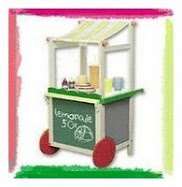
To be honest, the first job I ever aspired to as a child was to be a bin lady. Note: bin lady not bin woman - I have standards. That was because I was fascinated (and still am, if you want to know) by bin lorries, or dust carts if you're from the other side of the pond. I love how they mash up the litter.
However, I soon changed ambition to being a missionary. I grew up near the David Livingstone memorial in Blantyre. While my contemporaries were idolising the Bay City Rollers, I was captivated by the story of David Livingstone. I had a book called "The Great Explorers" in which one of the chapters was about Dr Livingstone. One of the things that remained in my childish imagination was a picture (not, but not unlike, the one above) illustrating the assertion that David Livingstone died while in prayer.
When I left school I began studying medicine at university, and read more and more about being a missionary. However, my medical career was very short-lived and after two years at university I knew it wasn't for me. To tell the truth I'm so squeamish I couldn't even now watch a whole episode of Casualty. When I go to give blood I struggle even with the pin prick thing they do on your thumb to check you're not anaemic.
The missionary thing wasn't out of my system, though. A few years later, I became very interested in Wycliffe Bible Translators. In fact I completed some of the application process to become a translator and although in the end it wasn't God's plan for me I still take an interest in their work. Today I came across this fascinating gem in their prayer diary:
"Getting the Right Word.
Translators want to get the right word out! So they must ask the right question. For example, in order to translate “carry one another’s burdens”, the Koma translators in Ghana had to choose between mili (carry on the back), dogi (carry on the hip), vigi (carry on the shoulder) and chii (carry on the head)! So which word did they use? (Hint: What do Koma people carry where?). Please pray for translators who have to make difficult word choices to convey the right meaning.
Answer: Babies are carried on the back, toddlers on the hip; tools on the shoulder, and heavier items like water pots on the head. So they used chii".
This year is the 400th of the publication of the King James Bible in English - for a long time the most common English translation of the Bible. Whilst it remains popular, many of us now use a more modern translation. I like many of the modern translations, including the New Living Translation, the New International Version, the Good News Bible and others. Yet there are many peoples around the world who don't have a choice of translation as we do. Many don't even have one book of the Bible in their own language.
As we English-speakers mark the 400th anniversary of the King James Bible this year, let's remember and perhaps even give some of our money, or our prayers, in support of the efforts of Wycliffe Bible Translators and others to make sure that the good news gets to "the ends of the earth".











No comments:
Post a Comment